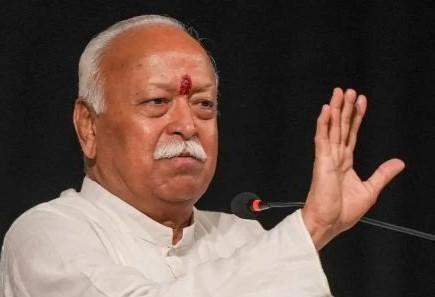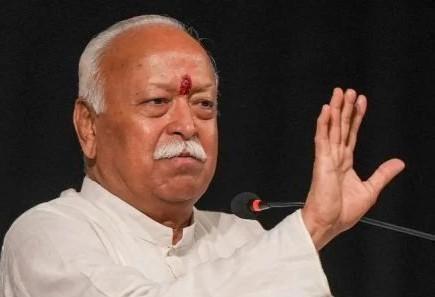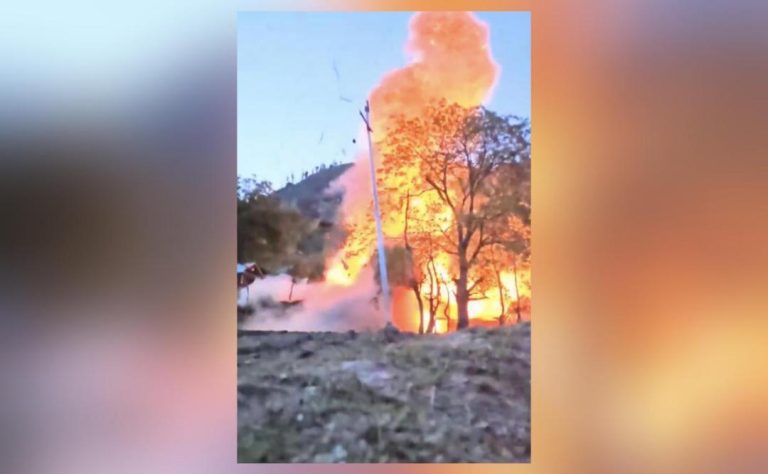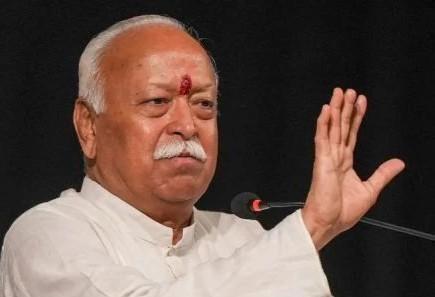
If Someone Turns to Evil Then We’ll Teach Lesson: Bhagwat on J&K Attack
India has always been a land of diverse cultures, beliefs, and values. The country has been a beacon of hope and peace for millions of people around the world. However, the recent terror attack in Pahalgam, Jammu and Kashmir has shaken the nation to its core. In the aftermath of this heinous act, RSS chief Mohan Bhagwat has made a bold statement that has sparked a lot of debate and discussion.
In a recent interview, Bhagwat said that non-violence is indeed India’s religion, but so is teaching a lesson to “oppressors and hooligans”. He emphasized that India has always been a peaceful nation and has never harmed or disrespected its neighbors. However, he also added that if someone is bent on being evil, there is only one cure, and that is to teach them a lesson.
Bhagwat’s statement has raised a lot of eyebrows and has sparked a heated debate on the nature of violence and its place in a peaceful society. While some people have hailed Bhagwat’s statement as a bold and necessary response to the growing threat of terrorism, others have criticized it as a call to arms and a violation of India’s commitment to non-violence.
It is true that India has been a victim of terror attacks for several years now, and it is natural to feel angry and frustrated when innocent lives are lost. However, it is also important to remember that violence only breeds more violence, and that the cycle of revenge and retaliation can never bring about lasting peace.
In this article, we will explore the implications of Bhagwat’s statement and examine whether it is possible to teach a lesson to those who are bent on evil without resorting to violence.
The Context of Bhagwat’s Statement
Before we delve into the implications of Bhagwat’s statement, it is important to understand the context in which he made it. The recent terror attack in Pahalgam was a brutal and senseless act that targeted innocent civilians. The attack was carried out by terrorists who have been waging a violent campaign against the Indian state for several years now.
The attack has left many people feeling angry, hurt, and betrayed. It is natural to feel this way, especially when innocent lives are lost. However, it is also important to remember that violence and retaliation are not the answer. Instead, we need to find ways to address the root causes of terrorism and to promote peaceful coexistence.
Bhagwat’s statement was made in this context. He was responding to the growing threat of terrorism and the need to find a way to address it without resorting to violence. His statement was not meant to be a call to arms, but rather a recognition of the need to take a strong stand against those who are bent on evil.
The Concept of Non-Violence
Non-violence is a fundamental principle of Indian philosophy and is a key part of the country’s cultural heritage. The concept of non-violence is not just about refraining from physical violence, but also about avoiding verbal and emotional violence. It is about fostering a sense of compassion, empathy, and understanding, and about promoting peaceful coexistence.
Gandhi, the father of the Indian independence movement, was a champion of non-violence. He believed that non-violence was not only a moral principle, but also a practical tool for achieving social change. He used non-violent resistance to challenge the British colonial rule and to achieve independence for India.
Non-violence is not just a moral principle, but also a practical tool for achieving peace and stability. When we respond to violence with violence, we create a cycle of revenge and retaliation that can never be broken. Instead, we need to find ways to address the root causes of violence and to promote peaceful coexistence.
Teaching a Lesson
Bhagwat’s statement that we need to teach a lesson to “oppressors and hooligans” is a recognition of the need to address the root causes of violence and to promote peaceful coexistence. However, it is important to recognize that teaching a lesson does not necessarily mean resorting to violence.
In fact, teaching a lesson can take many forms. It can involve promoting education and economic development in areas that are prone to violence. It can involve promoting social justice and addressing the root causes of poverty and inequality. It can also involve promoting cultural exchange and understanding, and fostering a sense of shared humanity.
Teaching a lesson is not just about punishing those who have committed a crime, but also about rehabilitating them and reintegrating them into society. It is about creating a society that is just and equitable, and that promotes peaceful coexistence.
Conclusion
In conclusion, Bhagwat’s statement that we need to teach a lesson to “oppressors and hooligans” is a recognition of the need to address the root causes of violence and to promote peaceful coexistence. However, it is important to recognize that teaching a lesson does not necessarily mean resorting to violence.
Instead, we need to find ways to address the root causes of violence and to promote peaceful coexistence. We need to promote education and economic development, social justice and cultural exchange. We need to foster a sense of shared humanity and to promote a culture of non-violence.
In the end, the choice between violence and non-violence is not just a moral principle, but also a practical tool for achieving peace and stability. When we choose non-violence, we create a society that is just and equitable, and that promotes peaceful coexistence.
Source:






